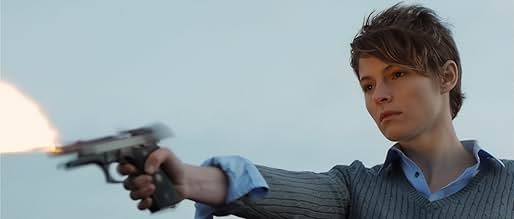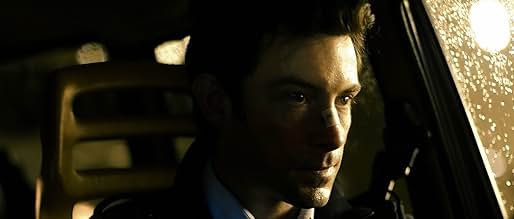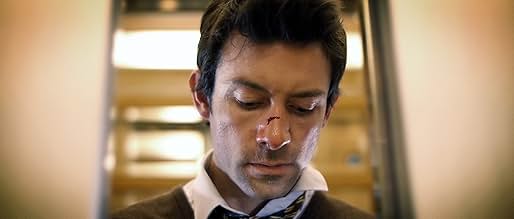A man and woman are drawn together, entangled in the life cycle of an ageless organism. Identity becomes an illusion as they struggle to assemble the loose fragments of wrecked lives.A man and woman are drawn together, entangled in the life cycle of an ageless organism. Identity becomes an illusion as they struggle to assemble the loose fragments of wrecked lives.A man and woman are drawn together, entangled in the life cycle of an ageless organism. Identity becomes an illusion as they struggle to assemble the loose fragments of wrecked lives.
- Awards
- 5 wins & 35 nominations total
Andreon Michael
- Peter
- (as Andreon Watson)
John Walpole
- Bank Investigator
- (as Trey Walpole)
- Director
- Writer
- All cast & crew
- Production, box office & more at IMDbPro
Featured reviews
Upstream Color is, by far, one of the absolute worst films I have ever seen. The movie is, and this is being nice, completely incomprehensible as a narrative work of film. It is nothing more than a bunch of random shots edited together with music and some occasional meaningless dialogue. It reminds me of the "video tests" people post to Vimeo when they're testing out their new still camera's video recording feature. The characters are never set up and the dialogue scenes are full of negative energy. As a result, I have absolutely no idea what they're talking about, I don't like them nor do I care what happens to them. I don't know what Shane Carruth was going for other than satisfying his own selfish need to vomit out this horrible tasting gallon of cryptic bile, but it certainly wasn't to try and entertain any human being with a normally functioning brain. I suspect the only reason this movie gets any press at all is due to its technical competency. That is, it looks like a properly shot movie and has a decent sound mix. If this movie had been shot "Dogme 95" style, I guarantee you would have walked out of the theater after 5 minutes instead of 10. The bottom line is that Shane Carruth does not respect a mainstream audience, and in fact takes every opportunity to insult them to their faces and mock them at the same time with this self-indulgent waste of projector lamp life.
After this movie ended, I was dumbstruck. I sat looking at the end credits, searching through what I had just watched, remembering the film vividly, and yet having it still be a blur.
Upstream Color is not a literal movie. The plot is never explained directly to the viewer, and the actions taken by the characters are unclear in reason and motivation. The most obvious things I could say about the movie are that it is filmed very well, and it has a nice musical score.
But the movie is not about literal plot. It's not about literal characters. It's about feelings and thoughts. It's a movie about broken people trying to fix themselves. There are things everybody in the movie will understand, and there are things nobody will.
It's a lot like music. When you put on music, you know the mood, and you know the melody, and you know the tempo and the harmony, and it can be a beautiful experience, even though you have no idea what the lyrics mean. And upstream color is a lovely, almost meditative movie about the lives of everyone being interconnected, and about how when people form companionship they start to become one, and yet someone else may say totally opposite things than I'm saying, and they wouldn't be wrong.
It's not a movie for people that think a film must have a literal story. It's not a movie for people who won't watch an hour and a half of meditation. It's not for people who see movies to see stories. And there is no shame in disliking this movie. But if you can appreciate an abstract story and can sit through an hour and a half of meditation, this is the movie for you.
Stanley Kubrick said in his later years: "A film is - or should be - more like music than like fiction. It should be a progression of moods and feelings. The theme, what's behind the emotion, the meaning, all that comes later." If Stanley Kubrick were alive today, I think he would have liked this movie a lot.
Upstream Color is not a literal movie. The plot is never explained directly to the viewer, and the actions taken by the characters are unclear in reason and motivation. The most obvious things I could say about the movie are that it is filmed very well, and it has a nice musical score.
But the movie is not about literal plot. It's not about literal characters. It's about feelings and thoughts. It's a movie about broken people trying to fix themselves. There are things everybody in the movie will understand, and there are things nobody will.
It's a lot like music. When you put on music, you know the mood, and you know the melody, and you know the tempo and the harmony, and it can be a beautiful experience, even though you have no idea what the lyrics mean. And upstream color is a lovely, almost meditative movie about the lives of everyone being interconnected, and about how when people form companionship they start to become one, and yet someone else may say totally opposite things than I'm saying, and they wouldn't be wrong.
It's not a movie for people that think a film must have a literal story. It's not a movie for people who won't watch an hour and a half of meditation. It's not for people who see movies to see stories. And there is no shame in disliking this movie. But if you can appreciate an abstract story and can sit through an hour and a half of meditation, this is the movie for you.
Stanley Kubrick said in his later years: "A film is - or should be - more like music than like fiction. It should be a progression of moods and feelings. The theme, what's behind the emotion, the meaning, all that comes later." If Stanley Kubrick were alive today, I think he would have liked this movie a lot.
Greetings again from the darkness. This is no typical movie, so these will not be typical comments. In 2004, Shane Carruth became something of a cult hero with the Sundance Festival crowd when his debut film PRIMER won a Grand Jury Award. Nine years later, we get his follow-up ... the ultimate artsy, indie film for those who thrive on analysis and prefer to avoid a story ending wrapped up with a neat bow.
These comments will not give you much, but I can tell you the screening had many viewers who left frustrated and confused. The fragmented narrative can be a bit disorienting and it avoids the usual staple of a resolution at the end. The audience knows more than the characters, yet the audience is baffled while the characters just continue on.
The first segment of the film is when it's at its most traditional. We see Thief (Thiago Martins) perform some type of worm/parasite procedure that slowly brainwashes Kris (Amy Seimetz) or leads to mind control or loss of personality ... just depends how you prefer to describe it. We then see The Sampler (Andrew Sensenig) help her overcome thanks to a blood transfusion on his pig farm. Yes, really. Finally, Kris bonds with Jeff (Shane Carruth) as they seek to reassemble their lives and re-discover themselves. Watching them bicker over who belongs to what memory is frightening and fascinating. It makes you question the definition of personal identity, and what if we lost that (or it was stolen).
Nature plays a huge role here, along with the connection to Thoreau's Walden. Many will use the term pretentious. Some will call it boring. Still others will be drawn in by the imagery and sound (or sometimes lack thereof). Shane Carruth does not fit Hollywood and neither do his films. He is a writer, producer, director, co-editor, cinematographer, and actor. He clearly has a love of the material and his choice of Amy Seimetz really makes the film work. She is outstanding (and also a filmmaker). The tired phrase "it's not for everyone" certainly applies here, but if you are a Terrence Malick fan or just enjoy being challenged by somewhat abstract themes, this one is worth a look.
These comments will not give you much, but I can tell you the screening had many viewers who left frustrated and confused. The fragmented narrative can be a bit disorienting and it avoids the usual staple of a resolution at the end. The audience knows more than the characters, yet the audience is baffled while the characters just continue on.
The first segment of the film is when it's at its most traditional. We see Thief (Thiago Martins) perform some type of worm/parasite procedure that slowly brainwashes Kris (Amy Seimetz) or leads to mind control or loss of personality ... just depends how you prefer to describe it. We then see The Sampler (Andrew Sensenig) help her overcome thanks to a blood transfusion on his pig farm. Yes, really. Finally, Kris bonds with Jeff (Shane Carruth) as they seek to reassemble their lives and re-discover themselves. Watching them bicker over who belongs to what memory is frightening and fascinating. It makes you question the definition of personal identity, and what if we lost that (or it was stolen).
Nature plays a huge role here, along with the connection to Thoreau's Walden. Many will use the term pretentious. Some will call it boring. Still others will be drawn in by the imagery and sound (or sometimes lack thereof). Shane Carruth does not fit Hollywood and neither do his films. He is a writer, producer, director, co-editor, cinematographer, and actor. He clearly has a love of the material and his choice of Amy Seimetz really makes the film work. She is outstanding (and also a filmmaker). The tired phrase "it's not for everyone" certainly applies here, but if you are a Terrence Malick fan or just enjoy being challenged by somewhat abstract themes, this one is worth a look.
Baffling. Extraordinary. Pigs. Barely any dialogue. Beautiful looking. Directed by Shane Carruth (Primer), It's very challenging - so much so that I'm not even sure repeat viewings will shed any more light on it. It's definitely one for cinema purists who like to watch cerebral movies. In that respect it's more of an experience than a movie aligned with Terence Malick and Darren Aronofsky material. What's it about? The cycle of life? genetics? religion? morality? ethics? Probably all these things. What's clear is that Shane Carruth operates on a level that is different to most of us!
Ladies and gentlemen, I have rated this a 7.
Not going to go into why.
I don't see any 9&10 reviewers calling the 1&2 reviewers names or degrading them. So what's with the anger?
I love lots of different styles of books, music and films.
I played in a death metal band and screamed and growled almost impossible to understand lyrics.
One of my literature teachers heard one of our songs and asked me why so aggressive, messy and incoherent the music was. (It wasn't at all to me or our fans). I asked him to look at the water colour painting he had on the wall, it was one of his. I asked why the lines were blurred and colors mixed insrmtead of clear, sharp and defined lines; wouldn't that make the shapes and motives be easier to understand?
He just smiled and nodded.
If you don't like it, that's tooootally understandable. I don't like all the movies I watch either. And I might leave a comment about my experience.
But I really don't think those who did enjoy it have ANY need to lie or pretend as some of you have said, nor have anything to gain by writing an anaymous review here.
Hope we are more friendly here.
Did you know
- TriviaThe film that Kris is editing at the beginning of the movie is A Topiary, the film that Shane Carruth had begun production on before deciding to film Upstream Color instead.
- GoofsWhen the Sampler is incapacitating a pig with his instrument, the knot is thrown towards the pig's face and stretched. In the next frame, the wire knot is around the pig's body between its front & hind legs.
- ConnectionsFeatured in WatchMojo: Top 10 Best Sci-Fi Movies You've Probably Never Seen (2016)
- How long is Upstream Color?Powered by Alexa
Details
Box office
- Budget
- $50,000 (estimated)
- Gross US & Canada
- $444,098
- Opening weekend US & Canada
- $28,649
- Apr 7, 2013
- Gross worldwide
- $587,174
Contribute to this page
Suggest an edit or add missing content







































